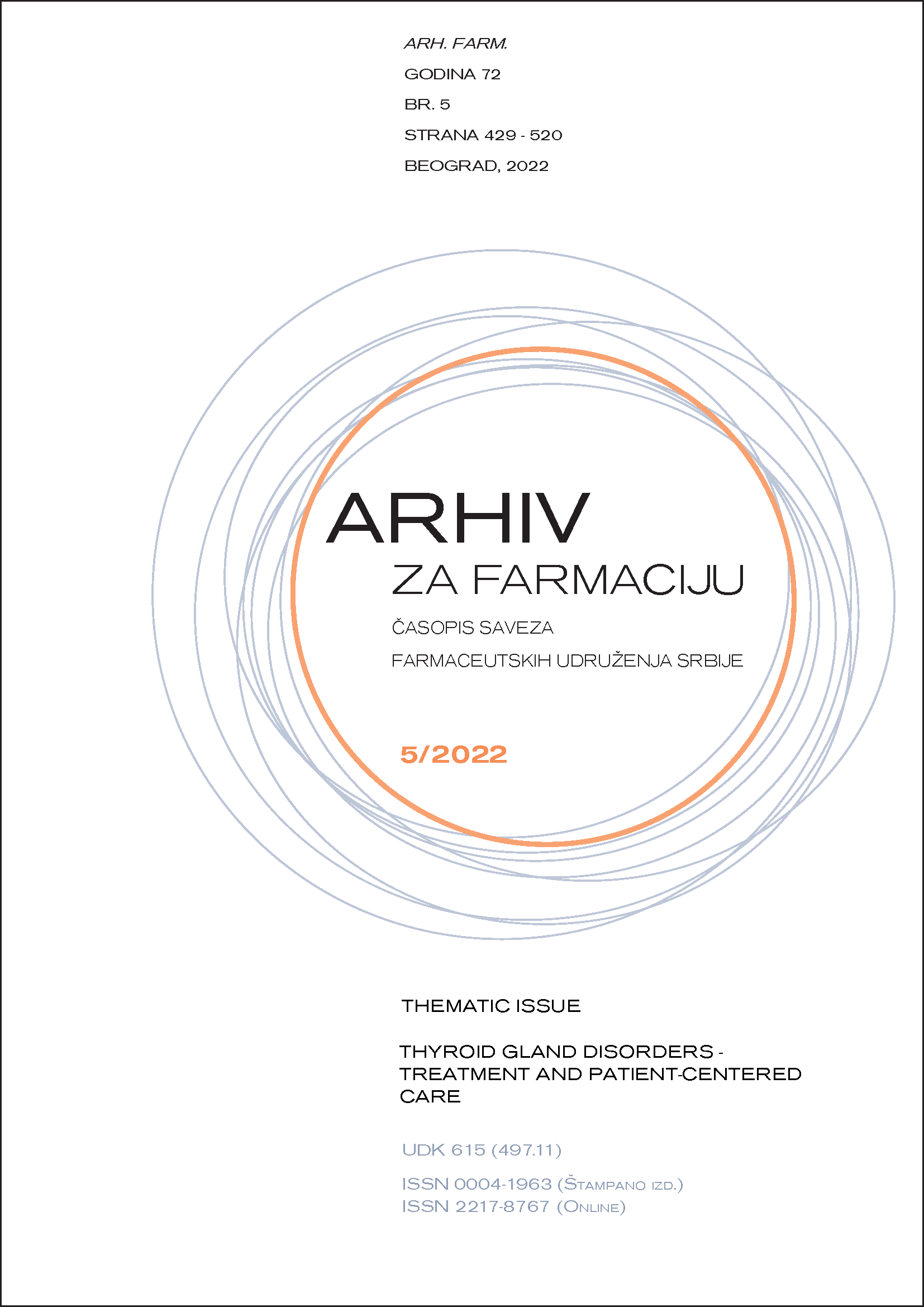
A Word from the Guest Editor
The thyroid gland, through the hormones it produces, influences almost every metabolic process in the body. Thyroid disorders may range from small, harmless goiters that do not require any treatment to life-threatening cancers. However, the most common thyroid problems are related to abnormal production of thyroid hormones. Too much thyroid hormone results in hyperthyroidism, while insufficient hormone production leads to hypothyroidism. Thyroid disorders are, rather, frequently encountered in the clinical practice, with a prevalence of primary hypothyroidism of 1-2% and primary hyperthyroidism of 0.4-2%. Hence, it is important to provide an overview of the current evidence on the topic that would contribute to the continuous education of pharmacists and other healthcare professionals.
This Special Issue consists of 6 manuscripts from several fields of medical and pharmaceutical areas prepared by the authors who are experts in the specific fields. Their oral presentation at the 73rd Symposium of Pharmaceutical Association of Serbia, held at Kopaonik, 2-5. June, 2022. entitled Thyroid function disorders - therapy and patient-centered care were highly appreciated by the pharmacists. As a member of the professional body responsible for the aforementioned course, I have kindly accepted the invitation to serve as guest editor of this special issue of the Archives of Pharmacy. This thematic issue, at the same time, provide other colleagues who did not attend the Symposium, to read about functional thyroid disorders.
The review of Mirjana Stojković focuses on the characteristics and the clinical presentation of hyperthyroidism and hypothyroidism, as well as on the results of specific laboratory tests that are essential in proper diagnosis. In order to achieve a euthyroid state, both clinical syndromes can be successfully managed, and pharmacotherapy of hyper- and hypothyroidism is described in work of Stepanović Petrović R. and Tomić M. The therapy of choice for hypothyroidism is levothyroxine, while thioamide is used in hyperthyroidism. Djuričić I. and associates presented a topic related to dietary modifications often required in patients with thyroid dysfunction. In the article they talked about the supplementation with iodine and selenium as popular interventions in these patients, and highlighted that the intake of food containing goitrogens should be limited. Various studies have shown the influence of mercury on the thyroid gland and thyroid hormones. Marić Đ. et al. were focused on benchmark modeling in their manuscript to determine the dose-response relationship between mercury levels in blood and TSH and thyroid hormones in serum.
Pharmacists have an important role in patient education and counselling, especially regarding therapy administration and adherence. Additionally, they can play an important role in identifying patients who should be referred to a physician, as well as in monitoring patients who have already been initiated on therapy. These aspects are coved in the article by Homšek A. et al. The work of Pecikoza U. represents an overview of all the practical aspects useful in everyday work with patients having thyroid gland disorders and paying special attention to patient’s counselling which includes when/how to administer the drug, monitoring requirements, duration of treatment, recognizing possible serious adverse effects and pregnancy related issues.
It is my honor and pleasure to have the opportunity to edit this thematic issue of the Archives of Pharmacy. I believe that its contents will provide valuable information for healthcare professionals in their everyday practice. I would like to extend my sincere gratitude to all authors who contribute to this issue of Archives of Pharmacy. Finally, I would like to express my warm thanks to Editor-in-Chief, Prof. Radica Stepanović Petrović, for inviting me and honoring me with the chance to be the Guest Editor of this issue.
Guest Editor/ deputy editor-in-chief
Katarina Vučićević, PhD PharmD, Full Professor
University of Belgrade – Faculty of Pharmacy
Department of Pharmacokinetics and Clinical Pharmacy
